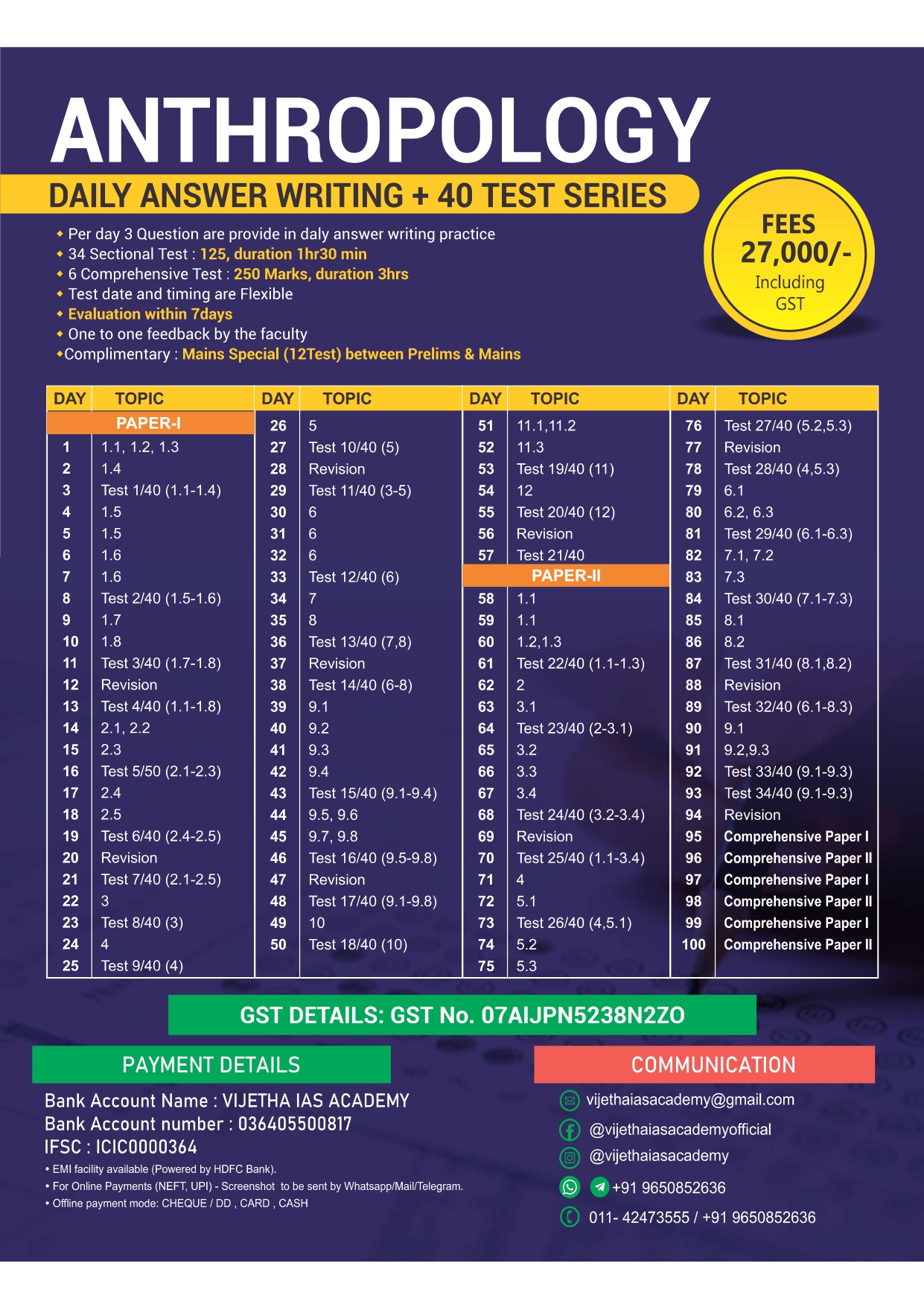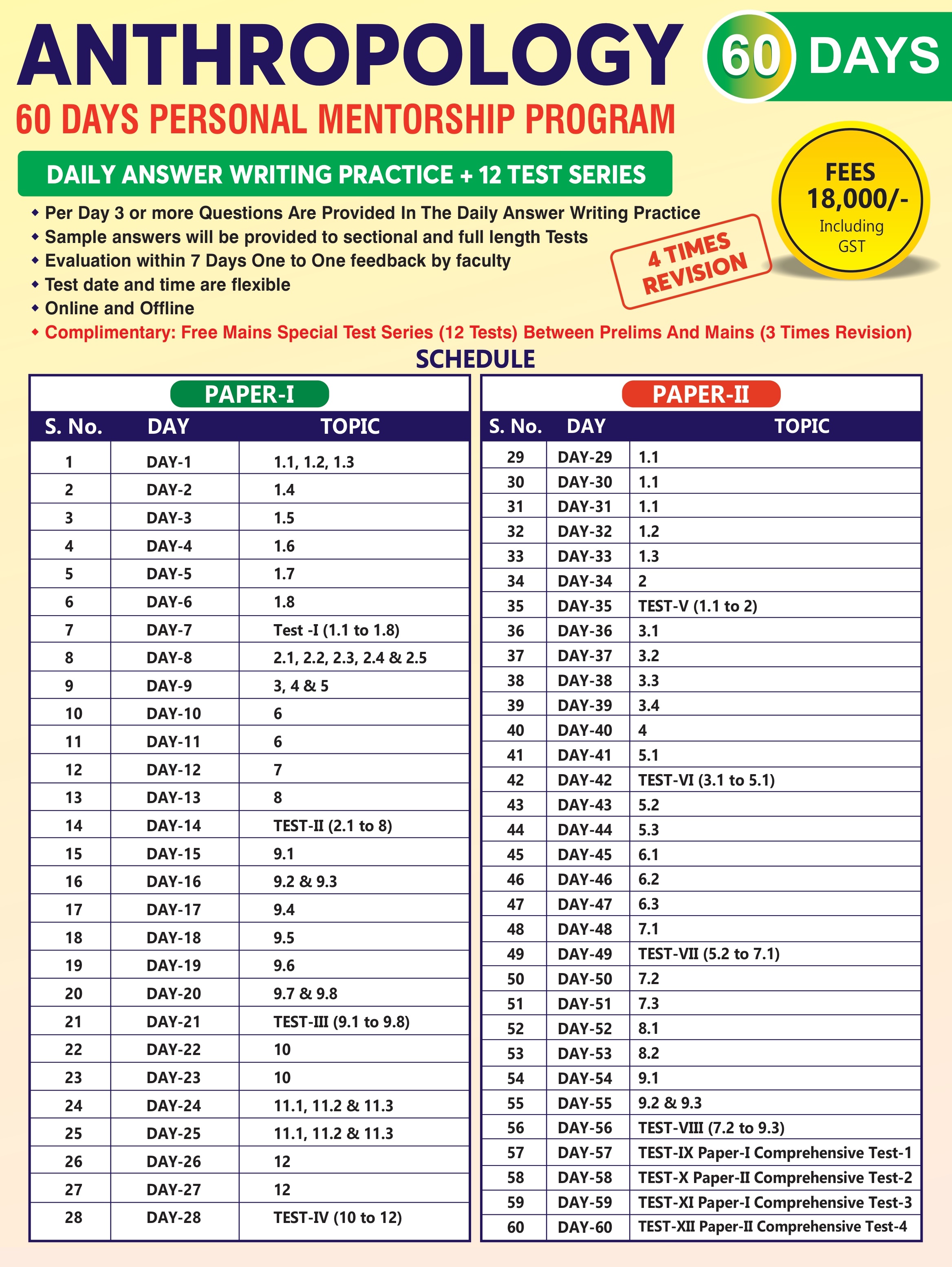
How is PESA Act empowering local self-governance and impacting women’s political participation?
(15 Marks) Anthropology Optional Paper CSE 2024
Introduction
The Panchayats (Extension to Scheduled Areas) Act, 1996 (PESA) was introduced to extend provisions of the 73rd Constitutional Amendment Act to India’s Scheduled Areas. The aim of the PESA Act is to promote local self-governance in tribal regions by empowering Gram Sabhas (village assemblies) to manage resources, resolve conflicts, and participate in decision-making processes, while respecting tribal customs and traditions. The Act has also positively impacted women’s political participation, particularly in traditionally patriarchal and marginalized tribal communities.
Main Body
PESA and Local Self-Governance:
Empowerment of Gram Sabhas: The PESA Act empowers Gram Sabhas in Scheduled Areas to make decisions related to the management of natural resources, such as land, water, and forests. Gram Sabhas have the authority to approve plans, manage minor forest produce, regulate the sale of intoxicants, and resolve local disputes.
Customary Laws and Traditions: PESA acknowledges the cultural and social distinctiveness of tribal communities by allowing them to follow customary laws and practices in local governance. This has given tribes greater control over their local affairs, reinforcing traditional systems of governance while integrating modern principles of democracy.
Land Acquisition and Resource Management: The Act provides for the consultation of Gram Sabhas in matters related to land acquisition and the resettlement of displaced persons, ensuring that tribal communities have a say in projects affecting their resources and livelihoods.
Decentralization of Power: PESA facilitates the decentralization of power, allowing tribal communities to have autonomy over their development processes and reducing the influence of external bureaucracies on local governance.
Impact on Women’s Political Participation:
Reservation for Women: PESA, aligned with the 73rd Amendment, mandates one-third reservation for women in local governance institutions, including Gram Panchayats and Gram Sabhas. This has opened up political spaces for tribal women, enabling them to participate in decision-making processes that affect their communities.
Increased Leadership Roles: With the mandatory reservation, many tribal women have taken up leadership roles as Sarpanches (village heads) and members of Panchayats, thereby challenging patriarchal norms and traditional male dominance in decision-making bodies. Their participation in these roles is gradually leading to greater gender equality in political representation at the local level.
Participation in Resource Management: Women's participation in Gram Sabhas has allowed them to actively engage in discussions about natural resource management, particularly those related to forest produce and land rights, which are central to tribal livelihoods. This has given tribal women a voice in issues that directly impact their socio-economic well-being.
Challenges: Despite the legal provisions, patriarchal attitudes and social norms often hinder women’s full participation. Women Sarpanches in some areas are proxy leaders, where male family members exercise real control. There are also educational and economic barriers that limit women’s effective engagement in governance.
Overall Empowerment through PESA:
Increased Accountability: By giving decision-making power to Gram Sabhas, PESA has improved accountability and transparency in the governance of tribal areas. This local governance model allows communities to prioritize their development needs and address grievances more effectively.
Cultural Preservation and Political Autonomy: PESA ensures that local governance is not imposed from the outside but rather aligns with the cultural norms and practices of tribal communities, giving them greater autonomy and helping preserve their identity.
Integration of Women in Governance: By mandating women’s political participation, PESA has helped integrate women into governance structures, giving them greater visibility and a platform to express their views on important matters. Over time, this can contribute to greater social and economic empowerment of tribal women.
Conclusion
The PESA Act is a landmark law that strengthens local self-governance in tribal areas by empowering Gram Sabhas to manage local resources and make decisions. It has had a profound impact on women’s political participation by providing reservations for women in local bodies, enabling them to hold leadership roles and participate in governance processes. However, despite its successes, challenges such as patriarchal resistance and limited access to resources remain, necessitating continued efforts to ensure that women’s participation in governance is meaningful and effective. Overall, PESA has laid the foundation for inclusive, participatory governance in India’s tribal areas, contributing to both local autonomy and gender empowerment.
Anthropology Test Series Programme (Online + Offline))
We provide Anthropology Daily Answer Writing a range of programs designed to cater to various stages of UPSC preparation. Whether you're just starting out, have attempted the Mains before, or are getting ready for Mains 2024, we have the right option for you. Allow us to assist you in choosing the course that best fits your needs.
|
Level of Preparation |
Test Series Program |
Test Series Content |
Test Schedule |
|
Self-study of Anthropology Optional |
Anthropology 100 Days Personal Mentorship Program |
Daily answer writing, 34 sectional tests, 6 comprehensive tests, and complementary Mains Special 12 tests (between prelims and mains) |
|
|
Revise whole syllabus through Daily Answer Writing Practice and Tests |
Anthropology DAW Mentorship Program |
Daily Answer Writing Practice and 8 sectional and 4 Full Length tests |
|
|
Revise whole syllabus through Sectional and Full Length Tests |
Anthropology Tier- I T-40 Test Series |
34 Sectionals and 6 Full Length Tests |
|
|
Written Mains earlier and need more practice |
16-Anthropology Tier II Test Series |
10 sectional and 6 Full-Length Tests. |
|
|
Cleared Prelims 2023 and are preparing for Mains 2023 |
Mains Special 12 Tests program |
8 Sectional and 4 Full-Length Tests |
ANTHROPOLOGY MAINS SPECIAL COURSES
Enroll in our Anthropology Mentorship Program today and take the first step towards achieving your UPSC goals!
1) If you are going for Self study of Anthropology Optional and looking for a Comprehensive Program that includes Daily Answer Writing, 34 Sectional tests, 6 Comprehensive tests, and Complementary mains special 12 tests (between prelims and mains), our Anthropology 100 Days Personal Mentorship Program is the perfect choice.
2) If you want to revise Whole Syllabus through Daily Answer Writing Practice and 8 sectional and 4 full length tests, then our Anthropology DAW Mentorship Program is the best fit for you.
3) If you want to revise Whole Syllabus through 34 Sectionals and 6 Full Length Tests then Anthropology Tier- I T-40 Test Series is for you.
4) If you have written Mains earlier and need more practice, then our 16-Anthropology Tier II Test Series is a great option. This test series includes 10 sectional and 6 full-length tests.
5) if you have cleared Prelims 2023 and are preparing for Mains 2023,our Mains Special 12 Tests program is a must-have. This program includes 8 sectional and 4 full-length tests to help you prepare for the big day.
For more information on Vijetha IAS Academy’s Anthropology mentorship programs Deatils : https://vijethaiasacademy.com/anthropology-test-series
Anthropology 100 Days Personal Mentorship Program ( 7 + 3 Times Revision )

Anthropology 60 Days Personal Mentorship Program ( 4 + 3 Times Revision )

For more information: https://vijethaiasacademy.com/anthropology-test-series
Details Of Anthropology Classes Program
Top Anthropology Optional IAS Coaching Center in Delhi Vijetha IAS Academy | Best Anthropology Optional IAS Coaching in Delhi
Fee Structure:
- Tier 1: Rs. 55,150/- (3 Years Validity of Offline/Live Batch)
- Tier 2: Rs. 42,000/-
- Tier 3: Rs. 36,000/-
Batch Size: 50 – 60 Students
UPSC Notes
Anthropology Optional IAS Coaching Notes, IAS Exam Preparation Booklets, IAS optional coaching Notes, UPSC Coaching Notes, Video Lectures, Live Classes with faculty, Chat Facility Available
Teachers Name: N P Kishore Sir
Past Result
- Last Years Result 2023
- 35 Total Selections in CSE 2023
Google Reviews: 4.9 out of 5 stars
Website: Vijetha Anthropology Optional IAS Coaching in Delhi (https://vijethaiasacademy.com)
Faculties of Vijetha IAS Academy
- N P Kishore Sir
Features
- Vijetha IAS Academy offers Online and offline Courses for better preparation of Anthropology Optional Strategy for UPSC in Delhi.
- For better Anthropology optional Exam Preparation, Vijetha IAS Academy Delhi Conducts the Motivational IAS Session.
- Vijetha IAS Academy provides you with the CASE STUDIES on the pattern of the real-time IAS Exam which is helpful for better preparation of the Best Coaching for UPSC Anthropology Optional Optional IAS Examination.
- DAW & WAW – Revision Through Daily & Weekly Answer Writing Practice is offered by Vijetha IAS Academy for better result of the Anthropology Optional IAS examination.
Advantages of joining Vijetha IAS Academy
- Best Faculties for Anthropology Optional IAS Coaching in Delhi
- Best facilities, infrastructure and updated Case Studies Booklets and Notes for better preparation of the Anthropology Optional IAS Examination in Delhi.
- Best result in Past years for Anthropology Optional Strategy for UPSC Examination in Delhi
- Best Rated coaching institute for Anthropology Optional IAS Examination in Delhi.
- Vijetha IAS Academy also provides recorded lectures videos, notes which is very helpful for better preparation of Anthropology Optional IAS Coaching in Delhi
Fees Structure of Vijetha IAS Academy
|
Tier 2 |
Tier 1 |
Tier 3 |
BATCH STARTS FROM |
|
42,000/- |
55,150/- (3 Years Validity Offline/Live Batch) |
36,000/- |
REGISTRATION – START |
Fees Structure of Vijetha IAS Academy
|
Course Name |
Fees Amount |
Course Duration |
|
GS Offline (Pre + Mains+ CSAT) with Essay+Answer Writing |
Rs.99,000 (Including GST) |
400+ Days |
|
GS Online |
Rs.18,999 (Including GST) |
400+ Days |
|
GS Mentorship Programme |
Rs.29,999 (Including GST) |
1 Year |
For more information on our courses, visit our Anthropology Courses page. Explore our Test Series and Online Courses for flexible learning options.
Vijetha IAS Academy
Add. 2nd Floor, 50, Shankar Road, Block 7, Old Rajinder Nagar, Rajinder Nagar, New Delhi, Delhi 110060
MOB. 096508 52636
Open 7 Am: Closes 9 PM
Keywords: Synergistic Effects of Biological and Cultural Factors in Human Evolution , anthropology 2024 question paper, Anthropology optional subject question paper 2024, Anthropology optional 2024 question paper, Anthropology Optional Coaching UPSC, Vijetha IAS Academy Anthropology, Anthropology crash course UPSC, Anthropology daily answer writing UPSC, Kishore sir Anthropology
